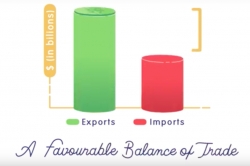This is the first professional animated presentation of one key aspect of the Douglas or British Social Credit case (not to be confused with Chinese 'Social Credit'): the folly of 'favourable' trade balances under the existing financial system, where physical loss and inefficiency are financially rewarded.
Please comment and share widely.




